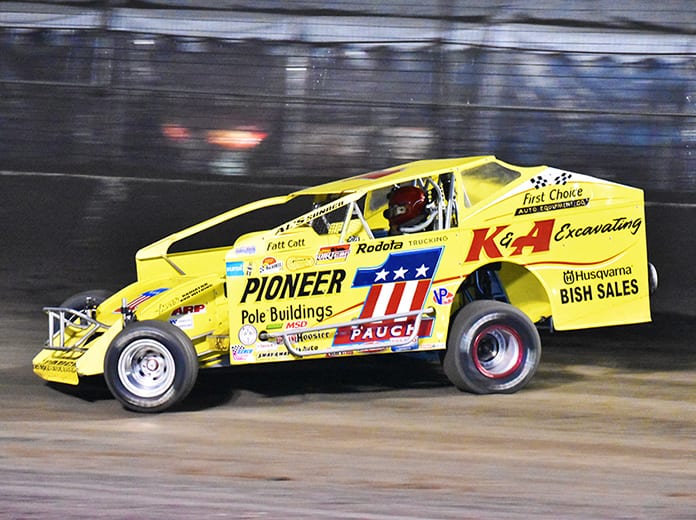CONCORD, N.C. — Many would agree that wheeling a Super DIRTcar Series big-block modified takes a unique driver skill set.
Massively powerful, torque-heavy engines, center steer chassis, wide bodies, and dirt-kicking Hoosier Racing Tires combine to make big-block modifieds one of the most exciting, and challenging forms of oval racing in the world.
In the past, a number of Super DIRTcar Series drivers have made forays into racing disciplines outside of their familiar big-block modified seat. Two of these drivers are Billy Pauch and Tim Fuller.
The legendary Billy Pauch, from Frenchtown, N.J., is one of the few drivers able to conquer both big-block modifieds and 410 sprint cars. Although he never followed the series full time, Pauch has accumulated 14 Super DIRTcar Series wins, which puts him 20th overall on the all-time wins list.
Although he’s successfully raced in a wide range of premier race car divisions, Pauch noted, “Modifieds are my forte.”
Pauch was inducted into the Northeast DIRT Modified Hall of Fame in 2016.
“Modifieds are what I grew up with and it’s what I feel most comfortable in. I love sprints, believe me, and I drove for a lot of good people in sprint cars. The Sprints are physical and more of a younger guy’s car,” said Pauch.
Pauch won one of the crown jewels of sprint car racing: The 1994 Supernationals at the New York State Fairgrounds mile speedway. The famous win was over the best drivers of the World of Outlaws NOS Energy Drink Sprint Car Series.
First, all the fan-favorite Frenchtown driver had to do to put the Zemco No. 1 sprint car on the front row was break a world record. So he did.
Pauch wheeled his trimmed-out sprinter around The Moody Mile, clocking in a blistering lap of 24.825 seconds which was over 144 mph average speed around the track.
This incredible record would stand until 2015 when Paul McMahan astonishingly broke the record at Rolling Wheels Speedway, ironically on the night before the final race on the famed Syracuse Mile.
Teams were known for building Syracuse specials. These were purpose-built designs for maximum straight-line speed. The unique creations found throughout the pit area were a part of the draw to The Moody Mile. Pauch’s Zemco entry was one of the most sealed-off sprint cars to ever roll off a trailer.
“It was my second year going to Syracuse with Zemco. They learned and watched the other teams. They were pretty sharp on getting the car aerodynamic,” said Pauch. “The team really slicked it up. That was the key. That and Davey Brown building the motor. Those together really gave me something special for Syracuse.”
Pauch also noted, “The biggest thing you can take back to the short tracks after a win like that is confidence. That always helps a lot.”
That and the $25,000 check.
Incredibly, Pauch raced at the top echelon of both Big Block Modifieds and sprint cars at the same time for many years, even fielding cars at NAPA Super DIRT Week in both divisions on the same weekend. Few drivers are that adaptable.
“When you ran sprint cars and modifieds at the same time, going back into the Modified was like slow motion,” Pauch said. “Things happen a couple of seconds slower on a mile racetrack. It made it easier to drive a modified but it didn’t make it easier to drive a Sprint of course.”
The speeds and treacherous nature made passing a premium on The Mile. Pauch preferred passing in the modifieds because “you had the addition of ‘rub rails’ which you don’t have on a sprint car so you could muscle your way up a bit. If you tried that in a sprint car you’d usually hook wheels and go for a ride. It was easier to pass with a modified,” Pauch attested.
Over the years, The Kid never shied away from a challenge. No matter what, he always drove the highest tier race car he could get his hands on.
After winning many races on Flemington Speedway’s dirt, Pauch spent some time on the new asphalt when the track was paved in 1991.
“Flemington was my home track. I won a lot of races there. In 1991 they paved it,” noted Pauch. “We switched the dirt cars over and ran the pavement but that only lasted for a couple of years. Then they went with the asphalt modifieds or what I call pancake cars.”
Click below to keep reading.
